| Srl | Item |
| 1 |
ID:
075468


|
|
|
| 2 |
ID:
156318
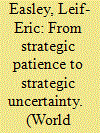

|
|
|
| 3 |
ID:
151990
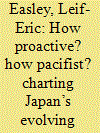

|
|
|
|
|
| Summary/Abstract |
After 60 years maintaining Self-Defense Forces rather than a normal military, Japan is moving towards exercising collective self-defence, long restricted by interpretations of its 1945 Peace Constitution. The merits of Prime Minister Abe Shinzo's ‘proactive pacifism’ are intensely debated by those welcoming greater international contributions from Japan and others suspicious of Japanese ‘remilitarisation’. A nation’s defence posture can theoretically be hijacked by aggressive nationalists, shift to pacifist isolationism, or rely on non-military internationalism or multilateral security cooperation. This article assesses competing explanations about the post-war trajectory of Japan’s defence posture by charting variation in military doctrine and capabilities. The analysis finds that Tokyo has made incremental policy adjustments under domestic and international constraints, and is not aggressively remilitarising.
|
|
|
|
|
|
|
|
|
|
|
|
|
|
|
|
| 4 |
ID:
174443
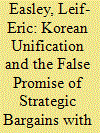

|
|
|
| 5 |
ID:
168441
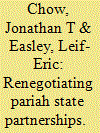

|
|
|
|
|
| Summary/Abstract |
Pariah status for violating international norms over decades increased Myanmar and North Korea’s dependence on China. Myanmar’s post-2010 reforms sought to reduce international sanctions and diversify diplomatic relations. North Korea pursued a diplomatic offensive after the 2018 Winter Olympics, but only after declaring itself a nuclear state. Why, despite both states’ politically unsustainable dependence on China, did Myanmar and North Korea pursue different strategies for renegotiating reliance? Unlike the Kim regime, Myanmar’s junta could step back from power while protecting its interests. Pro-democracy leader Aung San Suu Kyi was a credible signaler of reforms, providing Western governments political cover to reduce sanctions. Myanmar used liberalizing reforms to address internal threats, whereas North Korea utilizes external threats for regime legitimacy. The theoretical underpinnings and empirical trajectories of these distinctions–as well as Myanmar’s backsliding on human rights–explain why reducing reliance on China may prove more difficult than shedding pariah status.
|
|
|
|
|
|
|
|
|
|
|
|
|
|
|
|
| 6 |
ID:
132473
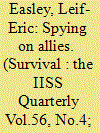

|
|
|
|
|
| Publication |
2014.
|
| Summary/Abstract |
Although some programmes crossed lines of propriety, US surveillance of partners did not constitute a breach of trust.
The United States is accused of monitoring the communications of other countries and collecting data on Internet users worldwide, following disclosures made by Edward Snowden, a former National Security Agency (NSA) contractor. US President Barack Obama implied that he did not order the NSA programmes for listening in on over 35 world leaders, including not only those of threatening states, but also those of allies, friendly countries and the United Nations.
|
|
|
|
|
|
|
|
|
|
|
|
|
|
|
|
| 7 |
ID:
192169
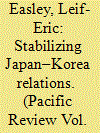

|
|
|
|
|
| Summary/Abstract |
By the time Prime Minister Abe Shinzo and President Park Geun-hye took office, Japan-South Korea relations were already experiencing a downturn over history issues and Lee Myung-bak’s unprecedented presidential visit to the disputed islets of Dokdo/Takeshima. Park’s refusal to hold a bilateral summit became the symbol of strained ties. Then on November 2, 2015 — 980 days after taking office — Park met Abe for bilateral talks in Seoul. On December 28, the two sides declared a rapprochement with an agreement supporting survivors of wartime brothels. Tensions worsened again during President Moon Jae-in’s term (2017–2022), contradicting the narrative that leaders had turned relations around in late 2015. Yet the diplomatic relationship was not on a downward spiral. Japanese and Korean policymakers managed to put a floor under their interactions owing to three stabilizing mechanisms that operated during both the Park and Moon administrations. First, political elites practiced mutual restraint to limit vicious cycles of nationalist recriminations. Second, Tokyo and Seoul carefully calibrated policies toward Beijing while avoiding divergence from each other. Third, reassuring the United States about the cost-effectiveness of its alliances involved trilateral cooperation that also helped stabilize Japan-South Korea relations.
|
|
|
|
|
|
|
|
|
|
|
|
|
|
|
|
| 8 |
ID:
175187


|
|
|